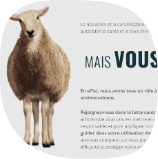OUR ACTION
United against
antimicrobial
resistance
The misuse or overuse of antimicrobials may result in resistance to these treatments, which threatens animal and human health. The OIE supports its Members in the implementation of good practices in the field.
Implementation of a global strategy, collection of data on antimicrobial use in animals, awareness raising of stakeholders, strengthening of the Tripartite Alliance FAO-OIE-WHO… In recent years, the OIE has multiplied initiatives to fight against antimicrobial resistance.
Dr Edilberto Brito discussed the use of tools developed by the OIE to fight against antimicrobial resistance in Colombia. He is the OIE National Focal Point for Animal Welfare and the Coordinator of the Primary Animal Production Safety Group of the Colombian Agricultural Institute (ICA).

“The OIE has guided our work on
antimicrobial resistance”
The OIE Strategy and the FAO−OIE−WHO Tripartite Agreement have guided our work on antimicrobial resistance in Colombia and encouraged synergies between our animal health sector and the human health, environmental and research sectors.
Since 2017, we have been developing our national plan for antimicrobial resistance with the Ministry of Health, research centres and producer associations. In terms of prevention, our work is based on that of the OIE. In particular, we are collaborating with producer associations like PorkColombia, to encourage the prudent use of drugs. In 2019, a campaign targeted all stakeholders in the pig and avian sectors and a national seminar brought together all the leaders of large livestock companies (cattle, pigs and poultry) in the country to raise their awareness of good practices when using antimicrobials.
Monitoring antimicrobial resistance for a better response
In 2020, we plan to continue raising awareness at the local and regional level, especially with producers and veterinarians in the field. Likewise, we intend to continue monitoring antimicrobial resistance, which we have been doing for several years in dairy, pork and laying-hen operations.
As for the collection of data on antimicrobial use in animals initiated by the OIE, that has also had a considerable impact on our actions. Until then, we had very little information, especially in terms of monitoring and risk analysis. However, these data are essential to focus our activities and are now the basis for improving our programmes against antimicrobial resistance.
In recent years, and in parallel with its work on antimicrobial resistance, the OIE has structured several global strategies. Their purpose: to guide governments in the design of national animal health and welfare plans. These strategies have been designed with a consultative approach involving experts, partners and OIE Members, in order to facilitate their adaptation at the regional and country level.
In 2019, the OIE intensified its efforts in the area of aquatic animal health: aquaculture is a rapidly expanding sector facing a high number of emerging diseases. In April 2019, the 4th Global Conference on Aquatic Animal Health held in Santiago de Chile paved the way for the development of a dedicated strategy, which will be launched in 2020.
Aquatic animal health

